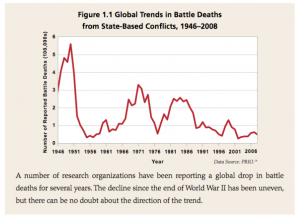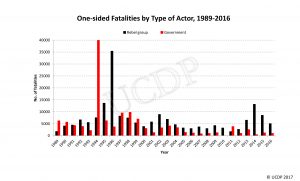By Suzanne Ghais, Ph.D. (sghais.com)
Last week I was lucky enough to attend the Alliance for Peacebuilding's annual conference. It was my first time attending, and I think it's my new favorite conference, striking what for me is the right balance of practical and practitioner-friendly topics but well informed by scholarship. One thing that struck me was how no one was dwelling on the difficult current political climate. Instead, everyone seemed fully engaged in whatever issues, regions, or goals they were working on; all seemed to continue with hope.
What about you? If you work in peacebuilding, peacemaking, conflict resolution, etc.--or are merely interested in these subjects--have you been feeling discouraged? I've certainly had my moments. These are not the brightest days for peace. Nativist, nationalist, exclusionary movements are ascendant in places ranging from Europe and the US to Turkey and India. The number of armed conflicts reached a post-Cold War peak of 52 in 2015, according to the Uppsala Conflict Data Program. There's a bit of an epidemic of presidents-cum-dictators overstaying their constitutional term limits in Africa. The danger of nuclear war feels the highest it's been since the 1980s. You've got some solid reasons for that grim look on your face.
The reality looks a bit different, though, if you step back and look at longer-term trends. Check out this graph from the Human Security Report 2013, p. 18:

It shows a bumpy but steep decline in deaths from armed conflict (where at least one party is a state) since the end of World War II. The graph only goes to 2008, but the number of deaths from armed conflict in 2016 was around 90,000 according to UCDP, still below the first horizontal line in this graph -- still a historic low.
Things are not quite as happy in the category of "one-sided violence" (see chart below or here) -- that is, organized violence targeting civilians, a category that includes both terrorism (included in the black bars) and attacks on civilians by government forces (red bars). (The 1994 red bar is literally off the chart at >500,000 due to the Rwandan genocide.) The recent peak of 2014 is driven by the Islamic State and others closely connected to Syria's civil war; it is coming back down. Even better, state violence against civilians (the red bars) is down considerably in the last 10 years compared to the previous 15.

So while war is down overall (despite a recent uptick), terrorism has been stubborn. However, there's another interesting point about terrorism. A State Department report notes on p. 5 that "74% of all deaths due to terrorist attacks took place in five countries (Iraq, Afghanistan, Nigeria, Syria, and Pakistan)." That means the bulk of the problems are in a few countries plagued by civil war or instability (and notice that the top two were invaded by the United States after the 9/11 attacks). This suggests that terrorism is more symptomatic of broader political conflict than its own distinct threat. Groups like Islamic State and Boko Haram exploit chaos and lawlessness. So to tackle terrorism, we need to keep working to end wars.
And we need to keep getting better at it, which I think we are, slowly. Peace processes account for more war terminations than ever before. In the period 2000-2006 (the latest data I could find), 61% of civil wars ended by negotiation rather than military victory (per Caroline Hartzell, “Civil War Termination,” Oxford Research Encyclopedia of Politics, Oct. 2016). That's compared to numbers well under 30% during the Cold War. Lots of peace negotiations fail, but later resume. Many countries at peace today underwent several distinct peace processes before finally landing on a workable, comprehensive settlement. There is progress to show for all of humanity's peacemaking and peacebuilding efforts. The political winds will change again. We need to press on.